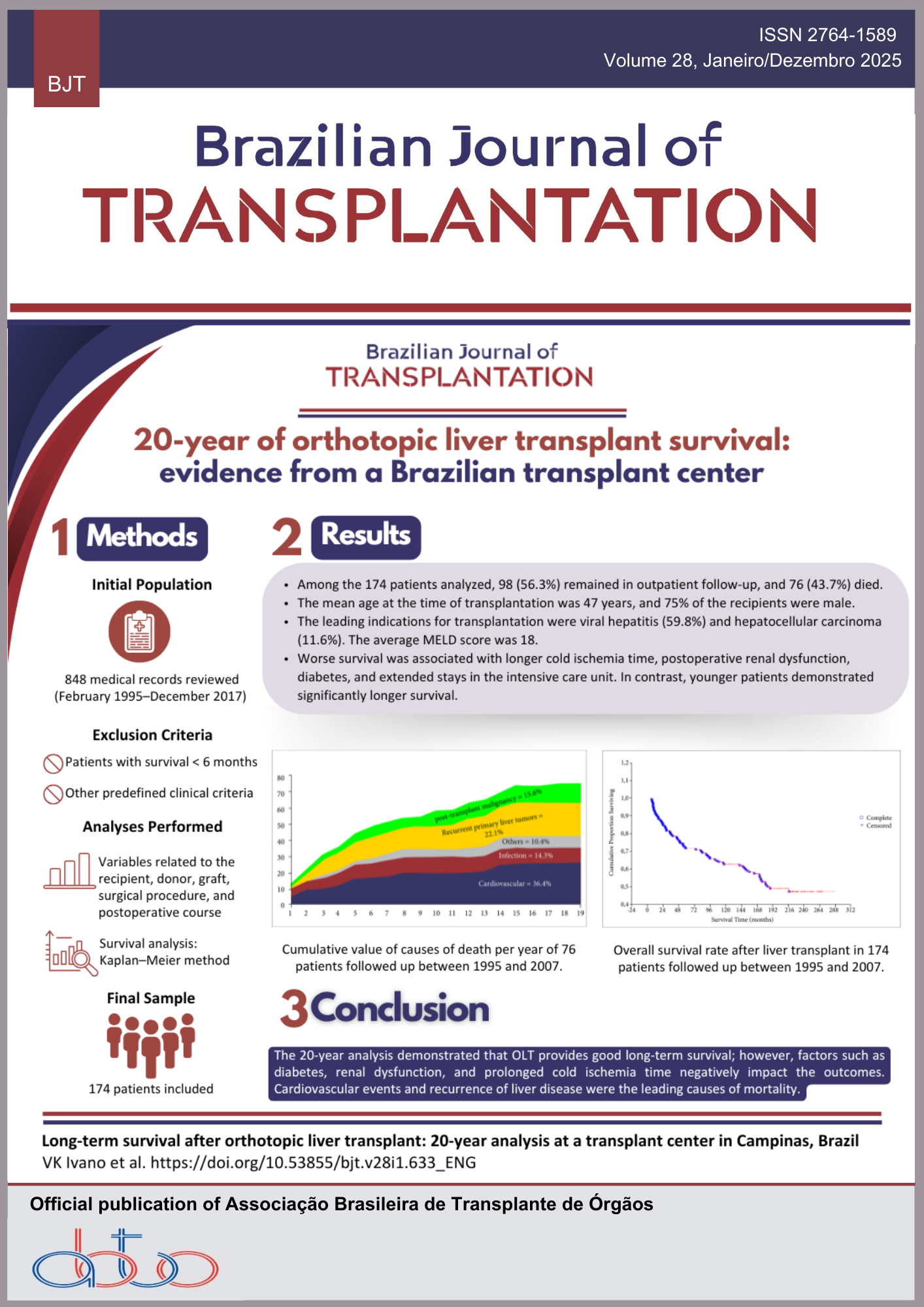Late Renal Effects of COVID-19 in Kidney Transplant Recipients: A Single-Center Study
Keywords:
Kidney transplantation, COVID-19, SARS-CoV-2, Post-Acute COVID-19 Syndrome, ProteinuriaAbstract
Introduction: During the coronavirus disease 2019 (COVID-19) pandemic, kidney transplant recipients had higher rates of hospitalization and mortality. However, data on the late renal effects of the infection are scarce. Objectives: This study aims to describe the evolution of renal function and proteinuria in kidney transplant recipients after the infection. Methods: Single-center prospective cohort study. A total of 321 kidney transplant recipients who survived COVID-19 from March 2020 to December 2022 were included. Data on renal function, proteinuria, and immunosuppression were analyzed pre-infection, 3 and 6 months post-infection. Results: Most patients were male (58.9%), with a mean age of 50 years, recipients of kidneys from deceased donors (79.4%), and with a median time after transplant of 6.6 years. There was a reduction in the level of immunosuppression, from a pre-infection Vasudev score of 4.66 to 4.50 (p< 0.001) in the 3rd month and 4.54 (p = 0.016) 6 months post-infection. The glomerular filtration rate (GFR) remained stable at around 60 mL/min/1.73 m2. The percentage of patients with proteinuria ≥ 1.0 increased from 9.6% pre-infection to more than 13% (p < 0.001) in the 3rd and 6th months after infection. Higher proteinuria levels were observed in recipients with longer follow-up post-transplant, previous rejection episodes, lower estimated GFR, and higher prevalence of donor-specific anti-HLA antibodies. Conclusions: Kidney transplant recipients with COVID-19 had an increase in proteinuria within 6 months after the infection despite a stable GFR.
Downloads
References
Copur S, Berkkan M, Basile C, Tuttle K, Kanbay M. Post-acute COVID-19 syndrome and kidney diseases: what do we know? J Nephrol, 2022; 35: 795-805. https://doi.org/10.1007/s40620-022-01296-y
Kremer D, Pieters TT, Verhaar MC, Berger SP, Bakker SJL, van Zuilen AD, et al. A systematic review and meta-analysis of COVID-19 in kidney transplant recipients: lessons to be learned. Am J Transplant, 2021; 21: 3936-45. https://doi.org/10.1111/ajt.1674
Requião-Moura LR, Sandes-Freitas TV de, Viana LA, Cristelli MP, Andrade LGM de, Garcia VD, et al. High mortality among kidney transplant recipients diagnosed with coronavirus disease 2019: results from the Brazilian multicenter cohort study. PLoS One, 2021;16: e0254822. https://doi.org/10.1371/journal.pone.0254822
Liakopoulos V, Roumeliotis S, Papachristou S, Papanas N. COVID-19 and the kidney: time to take a closer look. Int Urol Nephrol, 2022; 54: 1053-7. https://doi.org/10.1007/s11255-021-02976-7
Silver SA, Beaubien-Souligny W, Shah PS, Harel S, Blum D, Kishibe T, et al. The prevalence of acute kidney injury in patients hospitalized with COVID-19 infection: a systematic review and meta-analysis. Kidney Med, 2021; 3: 83-98.e1. https://doi.org/10.1016/j.xkme.2020.11.008
Bowe B, Xie Y, Xu E, Al-Aly Z. Kidney outcomes in long COVID. J Am Soc Nephrol, 2021; 32: 2851-62. https://doi.org/10.1681/ASN.2021060734
Vasudev B, Hariharan S, Hussain SA, Zhu Y-R, Bresnahan BA, Cohen EP. BK virus nephritis: risk factors, timing, and outcome in renal transplant recipients. Kidney Int, 2005; 68: 1834-9. https://doi.org/10.1111/j.1523-1755.2005.00602.x
Levey AS, Stevens LA, Schmid CH, Zhang Y (Lucy), Castro AF, Feldman HI, et al. A new equation to estimate glomerular filtration rate. Ann Intern Med, 2009; 150: 604. https://doi.org/10.7326/0003-4819-150-9-200905050-00006
de Sousa MV, Gonçalez AC, Zollner R de L, Mazzali M. Effect of preformed or de novo anti-HLA antibodies on function and graft survival in kidney transplant recipients. Ann Transplant, 2018; 23: 457-66. https://doi.org/10.12659/AOT.908491
Zhang R. Donor-specific antibodies in kidney transplant recipients. Clinical J Am Soc Nephrol, 2018; 13:182-92. https://doi.org/10.2215/CJN.00700117
Fotheringham J, Angel C, Goodwin J, Harmer AW, McKane WS. Natural history of proteinuria in renal transplant recipients developing de novo human leukocyte antigen antibodies. Transplantation, 2011; 91: 991-6. https://doi.org/10.1097/TP.0b013e3182126ed0
Masset C, Gautier-Vargas G, Cantarovich D, Ville S, Dantal J, Delbos F, et al. Occurrence of de novo donor-specific antibodies after COVID-19 in kidney transplant recipients is low despite immunosuppression modulation. Kidney Int Rep, 2022; 7: 983-92. https://doi.org/10.1016/j.ekir.2022.01.1072
Basic‐Jukic N, Juric I, Furic‐Cunko V, Katalinic L, Radic J, Bosnjak Z, et al. Follow‐up of renal transplant recipients after acute COVID‐19 – A prospective cohort single‐center study. Immun Inflamm Dis, 2021; 9: 1563-72. https://doi.org/10.1002/iid3.509
de Sousa MV, Gomes BT, Gonçalez AC, Mazzali M. Impact of COVID-19 on anti-HLA antibodies in kidney transplantation. Transpl Immunol, 2024; 86: 102092. https://doi.org/10.1016/j.trim.2024.102092
Tsampalieros A, Knoll GA. Evaluation and management of proteinuria after kidney transplantation. Transplantation, 2015; 99: 2049-60. https://doi.org/10.1097/TP.0000000000000894
Shamseddin MK, Knoll GA. Posttransplantation proteinuria. Clinical J Am Soc Nephrol, 2011; 6: 1786-93. https://doi.org/10.2215/CJN.01310211
Mohamed MMB, Velez JCQ. Proteinuria in COVID-19. Clin Kidney J, 2021; 14: i40-7. https://doi.org/10.1093/ckj/sfab036
de Sousa MV. Post-transplant glomerulonephritis: challenges and solutions. Int J Nephrol Renovasc Dis, 2024; 17: 81-90. https://doi.org/10.2147/IJNRD.S391779
Downloads
Published
How to Cite
Issue
Section
License
Copyright (c) 2025 Bruno Teixeira Gomes, Marcos Vinicius de Sousa, Fernanda Garcia Bressanin, Matheus Rizzato Rossi, Marilda Mazzali

This work is licensed under a Creative Commons Attribution 4.0 International License.









